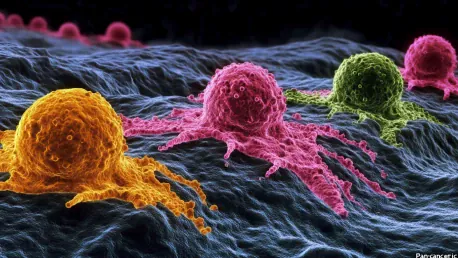A groundbreaking discovery in cancer research has unveiled a “genetic signature” involving 177 genes that are shared across multiple cancer types, fundamentally challenging prior assumptions about the mechanisms driving cancer metastasis. These findings open new avenues for innovative treatment strategies that could be universally applied across various cancers, potentially revolutionizing the approach to cancer therapy by focusing on shared genetic drivers rather than cancer-specific treatments.
Identification of Key Genetic Drivers
SP1 and KLF5: Crucial Genes in Metastasis
Research has revealed that two specific genes, SP1 and KLF5, play pivotal roles in the process of cancer metastasis. SP1, identified as an accelerant of metastasis, and KLF5, known for its metastasis-suppressing capabilities, were consistently present across a variety of cancer types, including lung and liver cancers. The discovery that these genes are central to metastasis irrespective of cancer type challenges the long-held belief that metastasis mechanisms significantly vary between different cancers.
By identifying these genes as universal drivers of metastasis, researchers can now explore therapies that target these specific genetic factors, potentially applying a single therapeutic approach across multiple cancers. This unified perspective, termed “pan-cancer” drivers of metastasis, holds the promise of developing comprehensive treatment solutions that are not confined to one specific type of cancer. The implications for the medical community are profound, as this could lead to the creation of broad-spectrum anti-metastatic drugs that could benefit a wide range of cancer patients.
Implications for Treatment and Patient Outcomes
The identification of SP1 and KLF5 as critical players in cancer metastasis significantly impacts future treatment approaches, offering the potential for more effective and universal interventions. By targeting these genes directly, oncologists may be able to halt the progression of metastasis more effectively, leading to improved patient outcomes. This discovery also provides insights into developing predictive tools for assessing metastasis risk based on the presence and activity of these genes, allowing for earlier intervention and personalized treatment plans.
Advancements in Diagnosis and Drug Repurposing
Early Diagnosis and Intervention Potential
One of the most promising aspects of this research is the potential for earlier diagnosis and intervention based on the 177-gene signature in cancer tumors. By analyzing this genetic signature, researchers can predict a patient’s risk of metastasis, enabling proactive treatment measures aimed at preventing cancer from spreading to vital organs. This early detection capability is a significant advancement in cancer care, offering the possibility of saving lives by catching and treating cancers before they metastasize.
The ability to identify patients who are at high risk for metastasis could lead to tailored treatment plans that address their specific genetic vulnerabilities, thereby enhancing the effectiveness of interventions. Early diagnosis and intervention have always been critical in cancer care, but this genetic signature approach offers a new level of precision and insight, potentially transforming patient outcomes and reducing the burden of advanced cancer stages.
Repurposing Existing Drugs to Target Genetic Drivers
In addition to early diagnosis, the study highlights the potential for repurposing existing drugs to target the identified genetic drivers of metastasis. One key example is Vorinostat, an FDA-approved drug currently used for other treatments, which has been identified as a candidate to block metastatic progression. This approach of repurposing drugs could significantly accelerate the availability of effective treatments for cancer patients, bypassing the lengthy process of developing new medications from scratch.
Using existing drugs that are already approved for other uses offers a pragmatic and expedited path to effective cancer treatments. By focusing on the genetic factors that drive metastasis, researchers can test and reapply known drugs in a new therapeutic context, potentially offering robust solutions for patients much sooner than through traditional drug development pipelines. This strategy underscores the importance of an integrative and adaptive approach in cancer treatment, leveraging existing medical knowledge to meet emergent challenges posed by metastasis.
Shifting Paradigms in Cancer Treatment
Toward Targeting Shared Genetic Vulnerabilities
This discovery marks a pivotal shift in the paradigm of cancer care, shifting focus towards targeting genetic vulnerabilities shared across different cancer types rather than tailored treatments for individual cancers. By understanding and targeting the genetic underpinnings that drive metastasis, researchers and clinicians can develop more versatile and universally applicable therapies. This approach not only broadens treatment options but also accelerates access to potentially life-saving medications, given the possibility of repurposing existing drugs.
The shift towards a genetic-based treatment strategy could also lead to more personalized risk assessments, allowing treatments to be tailored more precisely to individual patients. By mapping out the genetic landscape of a patient’s cancer, oncologists can devise treatment plans that address specific genetic anomalies, leading to better outcomes. This focus on genetic drivers is a natural progression in cancer therapy, reflecting advancements in genomic research and its application in clinical settings.
New Insights into Metastasis Progression
A monumental breakthrough in cancer research has led to the discovery of a genetic signature that involves 177 genes found across various types of cancer. This finding challenges previous beliefs about the mechanisms that drive cancer metastasis. By identifying a shared genetic signature, researchers have opened the door to new, innovative treatment strategies that can be applied broadly across different cancers. This could potentially transform cancer therapy by shifting the focus from treatments tailored to specific cancers to treatments targeting these shared genetic drivers. Such a universal approach in addressing cancer could lead to more effective treatment options and potentially improve patient outcomes on a wide scale, as it emphasizes the genetic commonalities among various cancers rather than their differences. This groundbreaking discovery not only enhances our understanding of cancer biology but also sets the stage for developing unified, cross-cancer therapies, offering hope for more efficient treatment protocols and better survival rates for cancer patients worldwide.









